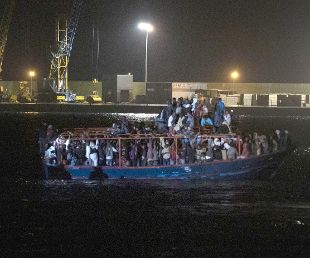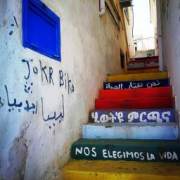Hotspot and deferred refusals: the Lampedusa-model
In Agrigento, the situation regarding
“refoulement” and expulsion of asylum seekers is getting worryingly high. Since
September, the Agrigento Police Station (Questura) has been issuing deferred decisions
on refusal of entry towards migrants coming from Gambia, Senegal, Ivory Coast,
Guinea, Nigeria, Ghana, Pakistan, Somalia, Eritrea, Morocco, Tunisia and Egypt.
The reasons are different. Generally, as
confirmed by the vice Prefect in a meeting held in Agrigento on December, 3rd,
the migrants who are not part of the reception system because of lack of
capacity in accommodation centres, have been rejected without getting any
information regarding the procedures for the recognition of international
protection. Moreover, the deferred refusals are systematically notified to
citizens coming from North African countries.
All migrants who got the form for
refusal of entry are transferred from the Lampedusa hotspot. There, they have
been at their arrival pre-identified and have become a Questionnaire, so called
“foglio notizie” (news-sheet), through which law-enforcement agents, supported
by Frontex officials, undertake a first screening and make a distinction
between potential asylum seekers and so called economic migrants, without
giving them any information regarding their right to seek asylum, as intended
in the Article 2 of the Consolidation Act on Immigration and in the Articles 10
and 10 bis of Decree no. 25/2008. The migrants are encouraged to sign the
Questionnaire, issued in a language they don’t understand and without receiving
any copy thereof. A rejected migrant from Ghana told his lawyer he had declared
as reason for escaping his country of origin his involvement in inter-ethnic
clashes and the resulting fear to come back to his homeland.
For several days now, it appears that
the representative of the UNHCR is providing information about asylum
procedures in collective and verbal form to the migrants who arrive in Lampedusa,
before they start with the police procedures. The migrants who are considered
to be potential asylum seekers are then lead to the Hub of Villa Sikania
(Siculiana), where they can seek international protection. The fate of those
migrants who are classified as “economic” is different. To those who are
intended to be rejected is notified the Decree on board the ferry to Porto
Empedocle and, once arrived at destination, they are left by the Police in the
late evening near the Agrigento train station. These people remain outside the
reception system and, because of the lack of places in dormitories, they live
on the streets and are also prevented from accessing a legal defence, as they
lack economic means and information about the territory’s services. Some
rejected Gambian migrants referred to their lawyers they have expressed their
will to apply for asylum to the police officers who escorted them on the ferry,
without any result. Others, who received the form for refusal of entry with the
inscription “refuse to sign”, have denied their refusal.
Some Pakistanis coming from Agrigento
turned to the Migration Office of the Questura of Palermo and to the
Commissariat of Licana to present the asylum application, but the officials of
the regional administration have refused to accept it, as the Questura of
Agrigento has rejected them.
A lawyer of other rejected migrants has
forwarded by certified mail (PEC) the clear expression of the migrant’s
intentions to seek international protection at the Migration Office in
Agrigento without getting any answer.
Finally, it should also be noted that,
among the rejected migrants of various nationalities, there are also different
vulnerable persons: unaccompanied minors, pregnant women, individuals suffering
from serious diseases, potential asylum seekers, victims of torture and
violence suffered in Libya or in their country of origin.
Lastly, the Questura of Agrigento is
rejecting all migrants who refuse to submit to the finger-printing verification,
after being illegitimately held for weeks inside the hotspot of Lampedusa.
Following the numerous arrivals of the
last days, the number of rejected migrants continues to grow.
We also report another unlawful approach
from the Prefecture of Agrigento concerning the expulsion of Asylum seekers in
the time interval within they are still allowed to contest the denial they have
been notified. This would only happen in cases of refusal for evident
groundlessness.
In the last months the Territorial
Commission of Agrigento has taken several measures of denial of international
protection as “clearly unfounded”, pursuant to Art. 32 paragraph 1, letter b)
bis of Decree 25/2008. Following regulatory changes made with Decree 142/2015,
in the case the application is manifestly unfounded, the period for appeal
shall be reduced to 15 days, but during this period, the asylum seeker can in
no way be expelled. Such unlawful expulsions – as for the Italian law the
migrants are to be considered as asylum seekers until the time for an appeal
against the decision to reject the application for international protection has
expired, as well as during the whole judicial phase – are becoming a way to
release places in accommodation centres and to limit the right of defence.
Under the Prefecture’s direct instructions, with the threat of severe
administrative penalties (judging by what some professionals of reception centres
of the Province have told us), all managing bodies have been instructed to
immediately send away all rejected asylum applicants.
Last but not least, the Territorial
Commission of Agrigento has rejected in the last months some asylum
applications by unaccompanied minors as manifestly unfounded, with the absurd
motivation they will soon become of legal age.
Legal Department Ass. Borderline Sicilia Onlus
Translation by Elena Baggetta


